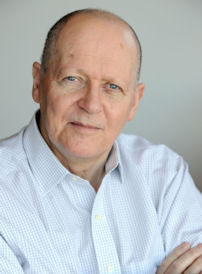 Born in Belfast and educated at Queen’s University Belfast, Conor O’Clery worked for The Irish Times, Ireland’s leading national newspaper, for over 30 years in various positions, including staff correspondent based in London, Moscow, Washington, D.C., Beijing and New York City. He wrote for The New Republic from Moscow, contributed columns to Newsweek International, and has been a frequent commentator on BBC, NPR and CNN. He was won several awards, including “Journalist of the Year” twice in Ireland: first in 1987 for his reporting of the Soviet Union, and, secondly, in 2002 for his reporting of the 9/11 attacks on the World Trade Center, which he witnessed from his office three blocks away. O’Clery has written a number of books on American, Russian and Irish politics, including an account of his world reporting called May You Live in Interesting Times. His latest book, Moscow, December 25, 1991/ The Last Day of the Soviet Union, will be published in August by Public Affairs in the U.S. and Transworld in the U.K. He is currently Ireland correspondent for GlobalPost, a foreign news website in the U.S. He resides in Dublin with his Russian-born Armenian wife, Zhanna.
Born in Belfast and educated at Queen’s University Belfast, Conor O’Clery worked for The Irish Times, Ireland’s leading national newspaper, for over 30 years in various positions, including staff correspondent based in London, Moscow, Washington, D.C., Beijing and New York City. He wrote for The New Republic from Moscow, contributed columns to Newsweek International, and has been a frequent commentator on BBC, NPR and CNN. He was won several awards, including “Journalist of the Year” twice in Ireland: first in 1987 for his reporting of the Soviet Union, and, secondly, in 2002 for his reporting of the 9/11 attacks on the World Trade Center, which he witnessed from his office three blocks away. O’Clery has written a number of books on American, Russian and Irish politics, including an account of his world reporting called May You Live in Interesting Times. His latest book, Moscow, December 25, 1991/ The Last Day of the Soviet Union, will be published in August by Public Affairs in the U.S. and Transworld in the U.K. He is currently Ireland correspondent for GlobalPost, a foreign news website in the U.S. He resides in Dublin with his Russian-born Armenian wife, Zhanna.
Talk On Conflict Hotels
Wherever there is a hot story or a conflict there is a hotel which becomes a magnet for correspondents, a meeting place to exchange gossip, meet revolutionaries and government agents, and size up the opposition. In Belfast during the Troubles it was the Europa, bombed more than two dozen times and frequented by loyalist and republican contacts alike. At the time of Tiananmen Square in Beijing it was the the Jianguo, built directly from the plans of an American motel. In East Timor it was the Turismo where the taxi-drivers lounging outside were agents of the Indonesian occupation. In Beirut during the Civil War it was the Commodore. In Lhasa in Tibet it is the Hotel Lhasa, which boasted rats in the air ducts and yak burgers in the dining room and from where plainclothes police followed journalists as they went into town. During the Russian invasion of Afghanistan it was the Intercontinental in Kabul where the telex operator ‘in those days before satellite phones’ had to be bribed with vodka to send out his despatches. In Jakarta during the downfall of Suharto it was the Hilton where correspondents could play tennis behind the perimiter hedge while the streets around rang with gunfire. Then of course there is Raffles in Singapore which once housed the United Press International office and where the last tiger in Singapore was shot under the billiards room” though most correspondents nowadays would not be seen dead with the tourists having a Singapore sling at the Long Bar.
Details of this year’s festival programme can be found elsewhere on this website.



